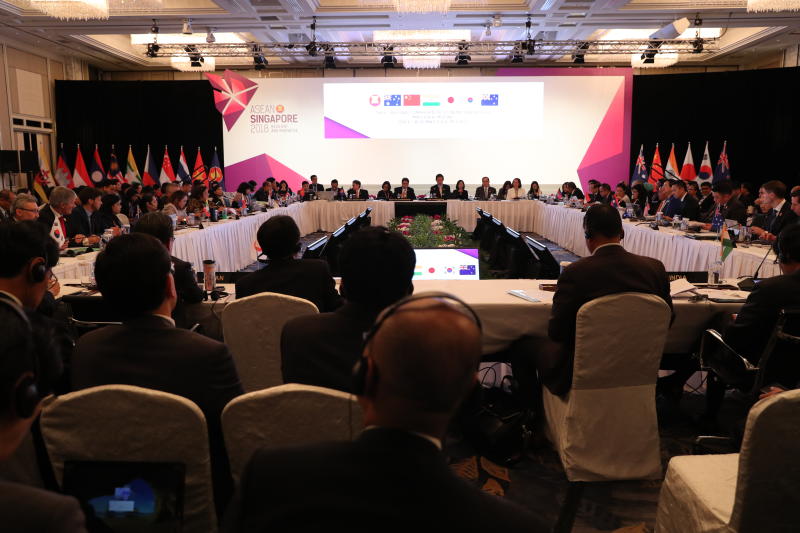India says RCEP negotiations to continue in 2019
Sign up now: Get insights on Asia's fast-moving developments

The 6th Regional Comprehensive Economic Partnership Ministerial Meeting, part of the 50th ASEAN Economic Ministers' Meeting, was held at the Shangri-la Hotel, on Aug 30, 2018.
ST PHOTO: TIMOTHY DAVID
NEW DELHI - India will continue with negotiations on the Regional Comprehensive Economic Partnership (RCEP)and is satisfied with the latest round of talks where it has made significant gains, according to top officials.
"The RCEP negotiations will not end in 2018. It has been agreed at the level of leaders that it will go on in 2019 as well and we will have opportunity to work on all the issues," Commerce Minister Suresh Prabhu told reporters on Tuesday (Sept 4).
The mega free trade agreement (FTA) covering goods, services and investment is being negotiated between the 10 member states of Asean as well as India, China, Australia, New Zealand, South Korea and Japan.
Trade ministers of the 16 countries met last week in Singapore to push forward the complex negotiations that would create the world's largest trading bloc, covering one-third of the world's gross domestic product and a quarter of its exports.
RCEP negotiations have been going on for six years and there have been 23 rounds of talks so far.
Speculation was rife that India would leave the negotiations, following the setting up of a ministerial committee to look into reservations that the country has on the trade agreement amid opposition by sections within the government and the industry.
The talks have also come into focus against the backdrop of growing protectionism in the United States and the eruption of trade wars, with the US hiking tariffs on aluminium and steel affecting China and other countries.
Yet Indian sensitivities in negotiations revolve around China. The Indian industry is fearful that decreasing tariffs for China would lead to Chinese goods flooding the Indian market and widening a trade deficit.
India's trade deficit with China was US$51 billion (S$70.1 billion) in 2016-17 in favour of China, which does not have an FTA with India.
Another area of concern is ensuring easier movement of Indian skilled workers in the RCEP countries and greater access to local job markets.
A Commerce Ministry official said that much more ground must be covered on RCEP but noted progress had been made in Singapore. He said that India now has a lot of room to handle China.
"It was agreed (during the talks) to give large flexibilities for countries," the official said.
These include an understanding that countries with no FTA with each other - like India and China - could negotiate tariffs bilaterally within a certain range.
Mr Prabhu also said that there had been progress in India's efforts to push for linking of services and goods negotiations.
"We have been emphasising on the inevitable linkage between services and goods negotiations, because RCEP is not a goods agreement alone, and services must be an integral part of the agreement. The linkage has been finally accepted," said the Commerce Minister.
India is weak in goods but strong in services, and has been arguing that talks on services, which means movement of its professionals, should be given equal importance as the goods negotiations.
Still, concerns remain among the countries involved in the RCEP that upcoming elections in India and Indonesia could impact the pace of the talks.
Analysts said that India would benefit from RCEP but the signing of the final draft would take a political call.
"RCEP is of considerable importance for the success of India's Act East policy," noted former Indian diplomat Rajiv Bhatia, distinguished fellow at think-tank Gateway House.
"There are serious concerns on a number of issues. One of the major things has been how to open up to China and others. I think uncertainty still remains (for India)."


